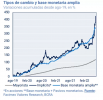Look at this chart of the blue and you can see what happened in Oct. 2020 and what is happening now: https://bluedollar.net/informal-rate/I'm not sure what the economic situation was in Argentina back in October 2020 (other than COVID), but there seems to be a lot happening both internally in Argentina and globally with recessions and war. Alberto seems severely weakened, currency reserves are low and IMF deadlines incoming fast.
Massa seems like a positive effect on the market right now, and is looking to get more reserves through US and EU banks. But who knows with Argentina. Wouldn't be surprised for it to rebound shortly.
1. There was a panic reaction then as now. Time will tell if this panic was justified.
2. Massa isn't going to get any reserves from anywhere. Nobody will give Argentina a cent. That doesn't mean that they don't have ways to control the dollar. We've seen it many times over the years.
3. It's terrible when this happens like this, because all the businesses raise their prices when the dollar spikes, and never lower them again. And what's worse is that when the dollar rises again, later, they'll raise the prices again!
4. If you look at the chart, you'll see that there were several partial rebounds that ultimately failed. It took a year before the dollar reached 195 again, and in that time there was inflation of 50%, so it was hardly exciting news. Not good for people with dollars, not good for people with pesos. A few Argentinos with strong unions managed to stay level with the inflation. Everyone else lost.


